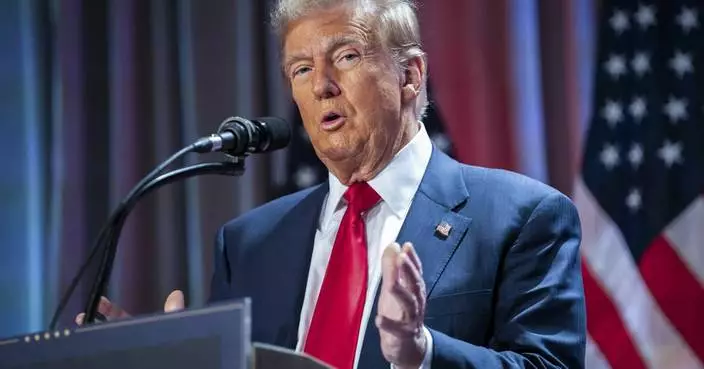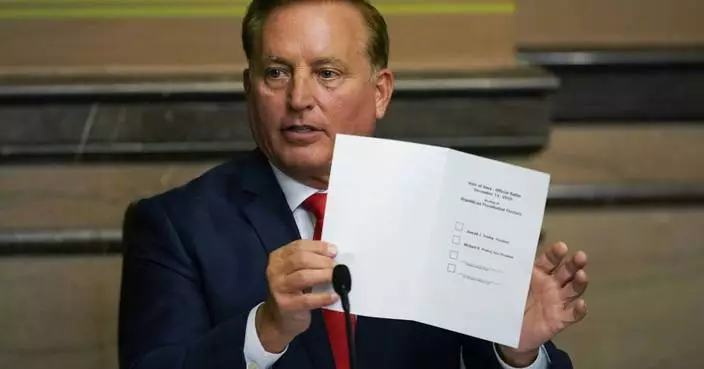NEW YORK (AP) — U.S. stocks tiptoed to more records amid a mixed Tuesday of trading, tacking a touch more onto what’s already been a stellar year so far.
The S&P 500 edged up by 2 points, or less than 0.1%, to set an all-time high for the 55th time this year. It’s climbed in 10 of the last 11 days and is on track for one of its best years since the turn of the millennium.
Click to Gallery
Holiday decorations are shown in front of the New York Stock Exchange in New York's Financial District on Tuesday, Dec. 3, 2024. (AP Photo/Peter Morgan)
FILE - Pedestrians cross Wall Street in New York's Financial District on Nov. 19, 2024. (AP Photo/Peter Morgan, File)
A person rides a bicycle in front of Tokyo Stock Exchange building Tuesday, Dec. 3, 2024, in Tokyo. (AP Photo/Eugene Hoshiko)
A person walks in front of Tokyo Stock Exchange building Tuesday, Dec. 3, 2024, in Tokyo. (AP Photo/Eugene Hoshiko)
Currency traders watch monitors at the foreign exchange dealing room of the KEB Hana Bank headquarters in Seoul, South Korea, Tuesday, Dec. 3, 2024. (AP Photo/Ahn Young-joon)
A currency trader passes by a screen showing the Korea Composite Stock Price Index (KOSPI), left, and the foreign exchange rate between U.S. dollar and South Korean won at the foreign exchange dealing room of the KEB Hana Bank headquarters in Seoul, South Korea, Tuesday, Dec. 3, 2024. (AP Photo/Ahn Young-joon)
Currency traders work near a screen showing the Korea Composite Stock Price Index (KOSPI) at the foreign exchange dealing room of the KEB Hana Bank headquarters in Seoul, South Korea, Tuesday, Dec. 3, 2024. (AP Photo/Ahn Young-joon)
The Dow Jones Industrial Average slipped 76 points, or 0.2%, while the Nasdaq composite added 0.4% to its own record set a day earlier.
AT&T rose 4.6% after it boosted its profit forecast for the year. It also announced a $10 billion plan to send cash to its investors by buying back its own stock, while saying it expects to authorize another $10 billion of repurchases in 2027.
On the losing end of Wall Street was U.S. Steel, which fell 8%. President-elect Donald Trump reiterated on social media that he would not let Japan’s Nippon Steel take over the iconic Pennsylvania steelmaker.
Nippon Steel announced plans last December to buy the Pittsburgh-based steel producer for $14.1 billion in cash, raising concerns about what the transaction could mean for unionized workers, supply chains and U.S. national security. Earlier this year, President Joe Biden also came out against the acquisition.
Tesla sank 1.6% after a judge in Delaware reaffirmed a previous ruling that the electric car maker must revoke Elon Musk’s multibillion-dollar pay package. The judge denied a request by attorneys for Musk and Tesla’s corporate directors to vacate her ruling earlier this year requiring the company to rescind the unprecedented pay package.
All told, the S&P 500 rose 2.73 points to 6,049.88. The Dow fell 76.47 to 44,705.53, and the Nasdaq composite gained 76.96 to 19,480.91.
In the bond market, Treasury yields held relatively steady after a report showed U.S. employers were advertising slightly more job openings at the end of October than a month earlier. Continued strength there would raise optimism that the economy could remain out of a recession that many investors had earlier worried was inevitable.
The yield on the 10-year Treasury rose to 4.23% from 4.20% from late Monday.
Yields have seesawed since Election Day amid worries that Trump’s preferences for lower tax rates and bigger tariffs could spur higher inflation along with economic growth. But traders are still confident the Federal Reserve will cut its main interest rate again at its next meeting in two weeks. They’re betting on a nearly three-in-four chance of that, according to data from CME Group.
Lower rates can give the economy more juice, but they can also give inflation more fuel.
The key report this week that could guide the Fed’s next move will arrive on Friday. It’s the monthly jobs report, which will show how many workers U.S. employers hired and fired during November. It could be difficult to parse given how much storms and strikes distorted figures in October.
Based on trading in the options market, Friday’s jobs report appears to be the biggest potential market mover until the Fed announces its next decision on interest rates Dec. 18, according to strategists at Barclays Capital.
In financial markets abroad, the value of South Korea’s currency fell 1.1% against the U.S. dollar following a frenetic night where President Yoon Suk Yeol declared martial law and then later said he’d lift it after lawmakers voted to reject military rule. Stocks of Korean companies that trade in the United States also fell, including a 1.6% drop for SK Telecom.
Japan’s Nikkei 225 jumped 1.9% to help lead global markets. Some analysts think Japanese stocks could end up benefiting from Trump’s threats to raise tariffs, including for goods coming from China.
Trade relations between the U.S. and China took another step backward after China said it is banning exports to the U.S. of gallium, germanium, antimony and other key high-tech materials with potential military applications.
The counterpunch came swiftly after the U.S. Commerce Department expanded the list of Chinese technology companies subject to export controls to include many that make equipment used to make computer chips, chipmaking tools and software. The 140 companies newly included in the so-called “entity list” are nearly all based in China.
In China, stock indexes rose 1% in Hong Kong and 0.4% in Shanghai amid unconfirmed reports that Chinese leaders would meet next week to discuss planning for the coming year. Investors are hoping it may bring fresh stimulus to help spur growth in the world’s second-largest economy.
In France, the CAC 40 rose 0.3% amid continued worries about politics in Paris, where the government is battling over the budget.
AP Business Writers Yuri Kageyama and Matt Ott contributed.

Holiday decorations are shown in front of the New York Stock Exchange in New York's Financial District on Tuesday, Dec. 3, 2024. (AP Photo/Peter Morgan)

FILE - Pedestrians cross Wall Street in New York's Financial District on Nov. 19, 2024. (AP Photo/Peter Morgan, File)
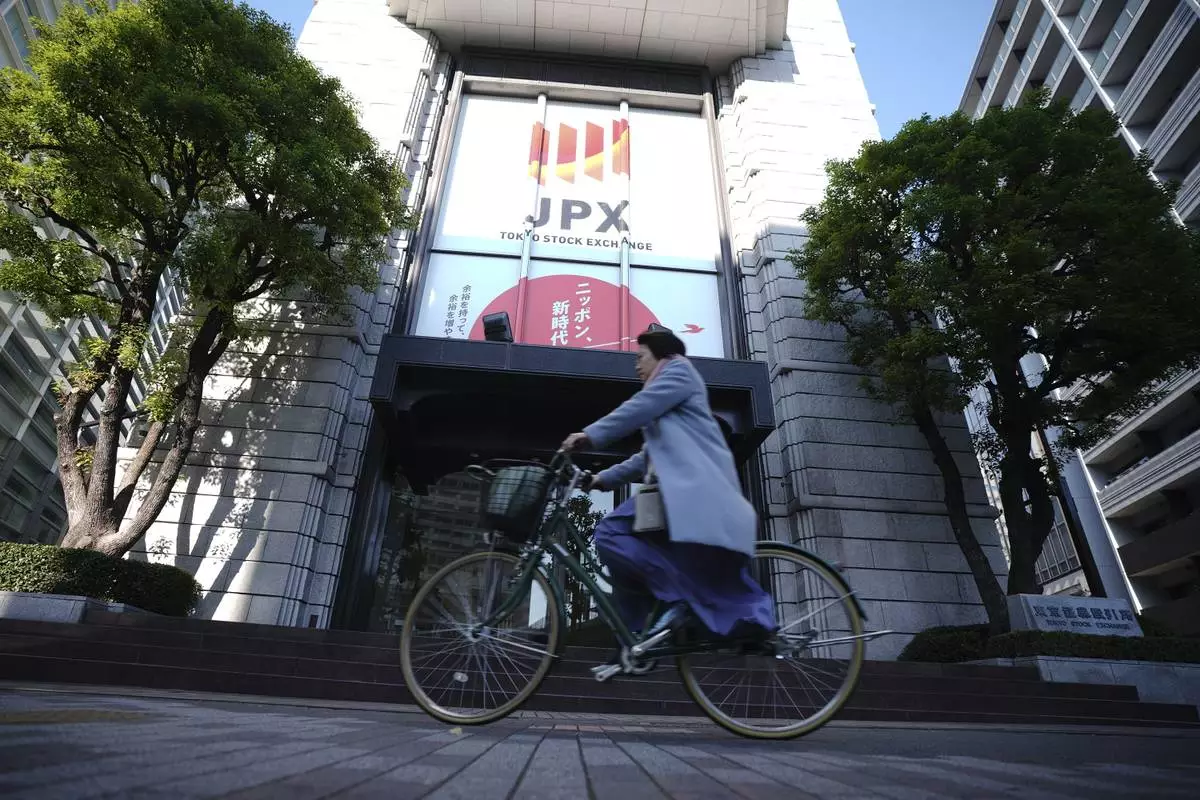
A person rides a bicycle in front of Tokyo Stock Exchange building Tuesday, Dec. 3, 2024, in Tokyo. (AP Photo/Eugene Hoshiko)
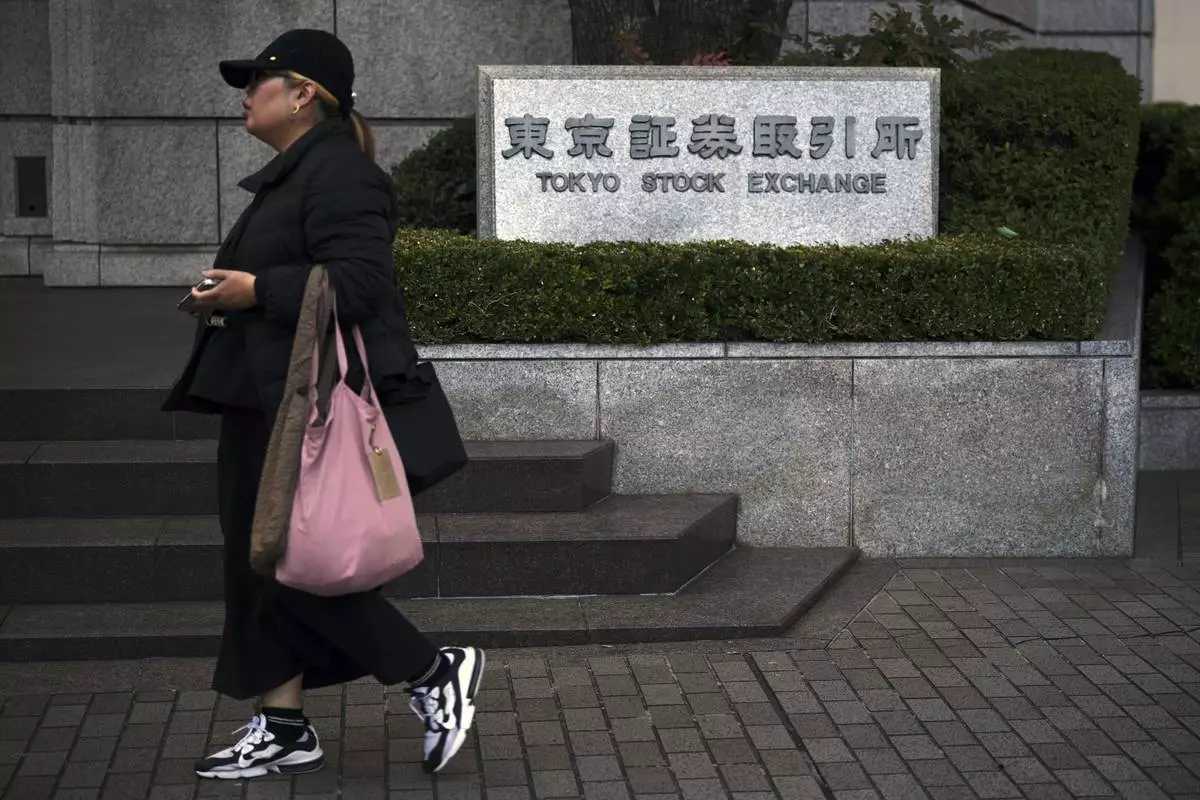
A person walks in front of Tokyo Stock Exchange building Tuesday, Dec. 3, 2024, in Tokyo. (AP Photo/Eugene Hoshiko)

Currency traders watch monitors at the foreign exchange dealing room of the KEB Hana Bank headquarters in Seoul, South Korea, Tuesday, Dec. 3, 2024. (AP Photo/Ahn Young-joon)

A currency trader passes by a screen showing the Korea Composite Stock Price Index (KOSPI), left, and the foreign exchange rate between U.S. dollar and South Korean won at the foreign exchange dealing room of the KEB Hana Bank headquarters in Seoul, South Korea, Tuesday, Dec. 3, 2024. (AP Photo/Ahn Young-joon)

Currency traders work near a screen showing the Korea Composite Stock Price Index (KOSPI) at the foreign exchange dealing room of the KEB Hana Bank headquarters in Seoul, South Korea, Tuesday, Dec. 3, 2024. (AP Photo/Ahn Young-joon)
WASHINGTON (AP) — President Joe Biden's decision to break his word and pardon his son Hunter has spurred a broader discussion about what else he should be doing with the broad clemency powers of the presidency before he leaves office in January, including whether he should even be pardoning Donald Trump.
Biden on Tuesday ducked questions on his decision on his son, ignoring calls for him to explain his reversal as he was making his first presidential trip to Angola.
He dismissed shouted questions about the matter with a laugh during a meeting with Angolan President João Lourenço at the presidential palace, telling the Angolan delegation: “Welcome to America.” Biden was not scheduled to take questions from the press during his trip to Africa, and he has largely avoided interactions with reporters since President-elect Trump’s victory last month.
Biden’s decision to offer his son a blanket pardon for actions over the past 11 years has sparked a political uproar in Washington, after the president repeatedly had said he would not use his extraordinary powers for the benefit of his family. Biden claimed that the Justice Department had presided over a “miscarriage of justice” in prosecuting his son, using some of the same language that Trump uses to describe his own legal predicaments.
Biden's reversal drew criticism from many Democrats, who are working to calibrate their approach to Trump as he prepares to take over the Oval Office in seven weeks. There is concern the pardon — and Biden's claims that his son was prosecuted for political reasons — will erode their ability to push back on the incoming president’s legal moves. And it has threatened to cloud Biden's legacy as he prepares to leave office on Jan. 20.
Hunter Biden is the closest presidential relative ever to be granted clemency, but other leaders have pardoned family members and close friends. Bill Clinton pardoned his brother Roger for drug charges after Roger Clinton had served his sentence. By the time Trump left office after his first term, he had issued 144 pardons, which included Charles Kushner, the father of his son-in law, Jared Kushner. He also pardoned fervent supporters Steve Bannon, Roger Stone, Paul Manafort, Michael Flynn and other people convicted in special counsel Robert Mueller’s Russia investigation.
In the months after the 2020 election, Trump and his allies were trying to overturn his loss, a failed effort that culminated in the violent riot by his supporters at the Capitol on Jan. 6, 2021. There were discussions at the time over whether Trump would preemptively pardon some of those involved in the effort — and maybe even himself — before he left office. But that never happened.
Now, Democrats are having similar discussions about preemptive pardons on their side because of Trump's rhetoric on the campaign trail. He's made no secret of his desire to seek revenge on those who prosecuted him or crossed him. He talks about "enemies from within." He's circulated social media posts that call for the jailing of Biden, Vice President Kamala Harris, former Vice President Mike Pence and Sens. Mitch McConnell and Chuck Schumer. He's also taken aim at Liz Cheney, a conservative Republican who campaigned for Harris, promoting a social media post that suggested he wanted military tribunals to punish her because she was guilty of treason.
Sen. Ed Markey, a Massachusetts Democrat, said last week on Boston Public Radio that Biden might consider broad pardons to protect people against whatever wrath Trump may seek, but also as a way to move the country past this acrimonious and divided time.
“I think that without question, Trump is going to try to act in a dictatorial way, in a fascistic way, in a revengeful first year at least of his administration toward individuals who he believes harmed him,” Markey said.
Presidents enjoy expansive pardon powers when it comes to federal crimes. That includes granting clemency to people who have not yet been charged, as President Gerald Ford did in 1974 when he pardoned his predecessor, Richard Nixon over the Watergate scandal. The decision at the time caused an uproar but has been seen in the ensuing decades as a move that helped to restore order.
Markey cited Ford's pardon as way for the country “just to close that chapter and move on to a new era.” Biden could do the same, Markey said, to help the country move on “to an agenda that deals with the ordinary families.”
Sen. Joe Manchin, the Democrat-turned-independent from West Virginia, took it a step further and suggested Biden should even pardon Trump for his efforts to overturn the 2020 election, federal charges that are now evaporating with Trump's upcoming return to the White House.
“Why don't you go ahead and pardon Donald Trump for all his charges?" he asked in an interview with CNN. “It would have gone down a lot more balanced. I'm just saying, wipe them out.”
At the same time, Democratic lawmakers and criminal justice reformers are pushing Biden to grant pardons to broad groups of Americans. Democrats Ayanna Pressley, Jim Clyburn and Mary Gay Scanlon wrote to Biden on Nov. 20, asking him to use his clemency powers to "address longstanding injustices in our legal system, and set our nation on the path toward ending mass incarceration.”
The letter, also signed by 61 others, suggested Biden could use his powers to send a powerful message of criminal justice reform and would "rectify unjust and unnecessary criminal laws passed by Congress and draconian sentences given by judges.”
“We encourage you to use your clemency powers to help broad classes of people and cases, including the elderly and chronically ill, those on death row, people with unjustified sentencing disparities, and women who were punished for defending themselves against their abusers,” they wrote.
So far, Biden has only pardoned 25 people, none with direct ties to him. Most presidents tend to grant a flurry of clemency requests at the end of their terms and it's likely Biden will do likewise. White House press secretary Karine Jean-Pierre has said Biden is “thinking through that process very thoroughly.”
Weissert reported from Luanda, Angola.
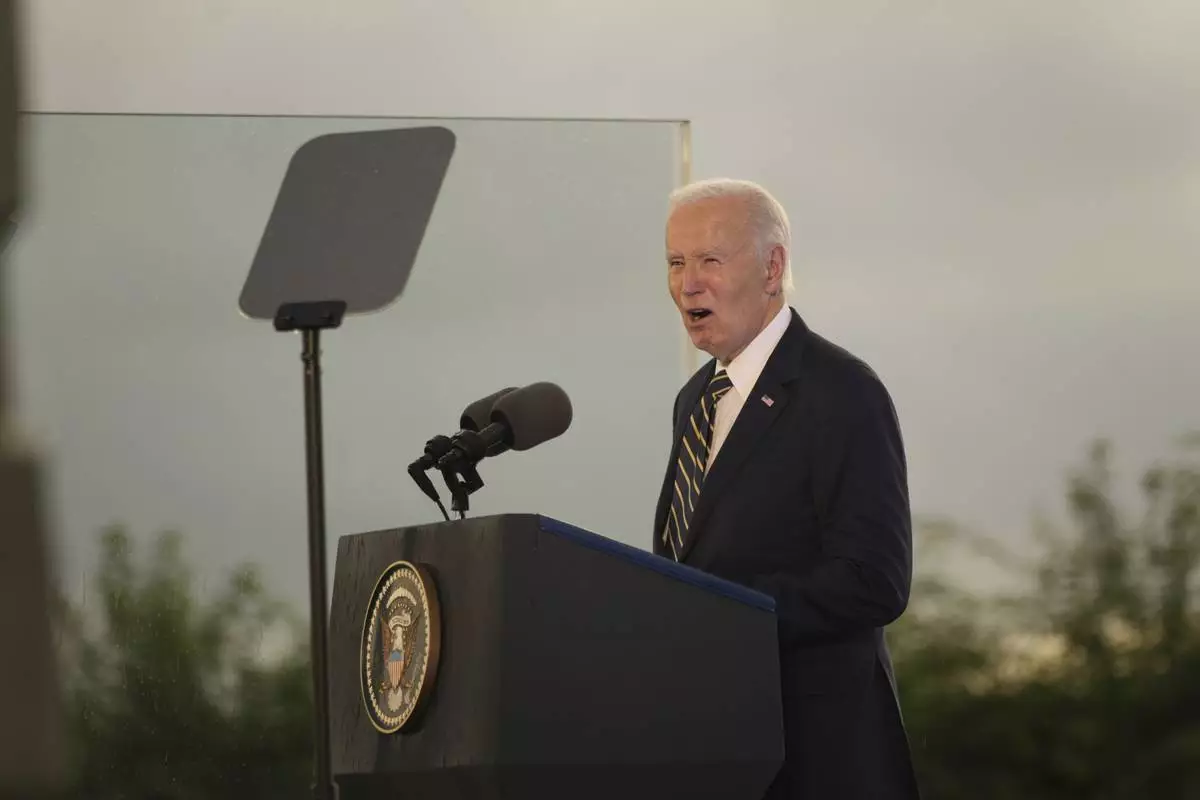
President Joe Biden speaks at the National Museum of Slavery, in the capital Luanda, Angola on Tuesday, Dec. 3, 2024. (AP Photo/Ben Curtis)
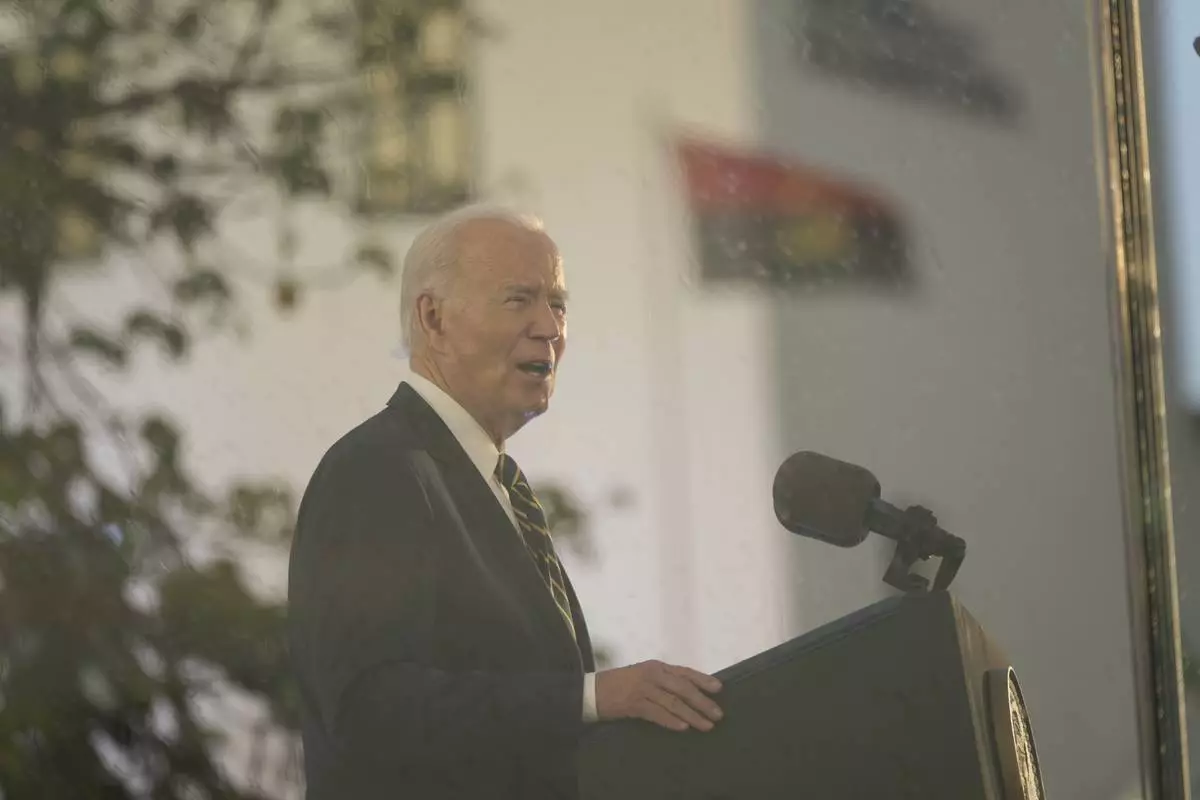
President Joe Biden speaks at the National Museum of Slavery, in the capital Luanda, Angola on Tuesday, Dec. 3, 2024. (AP Photo/Ben Curtis)

President Joe Biden and son Hunter Biden walk in downtown Nantucket Mass., Friday, Nov. 29, 2024. (AP Photo/Jose Luis Magana)
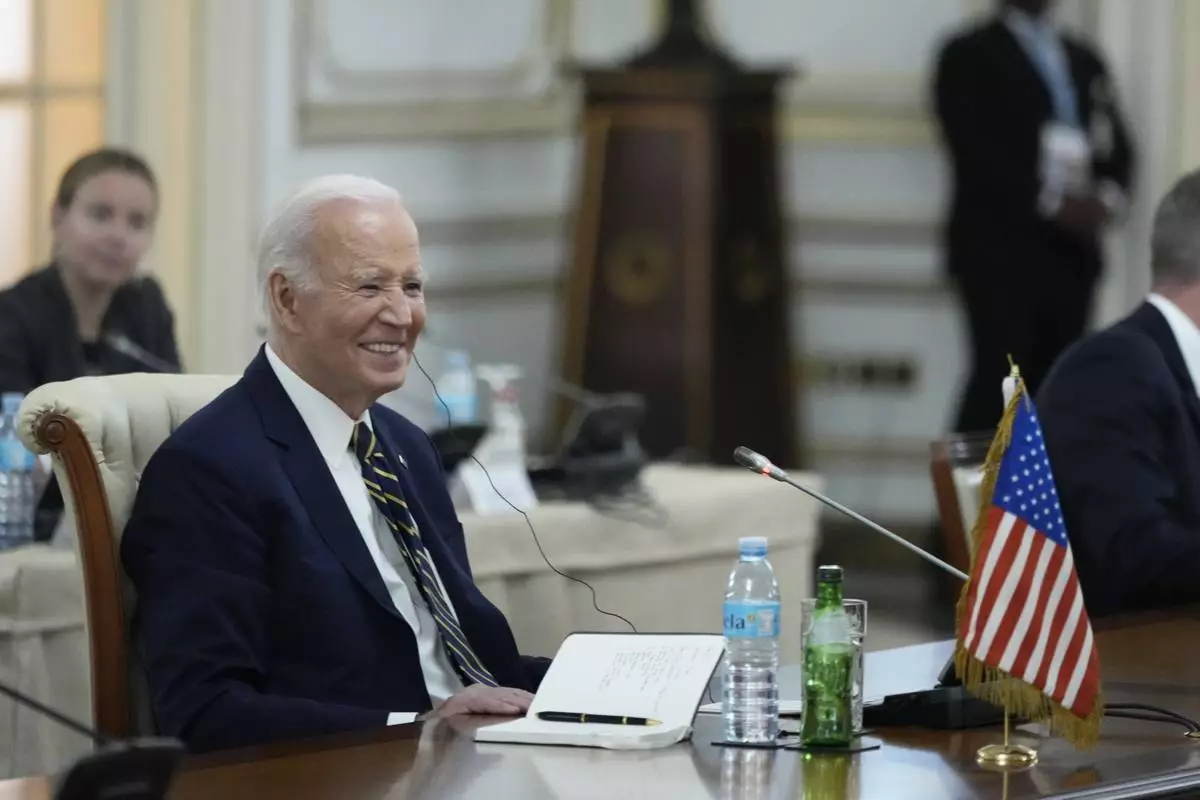
President Joe Biden meets with Angola's President Joao Lourenco, at the presidential palace in the capital Luanda, Angola on Tuesday, Dec. 3, 2024. (AP Photo/Ben Curtis)






















